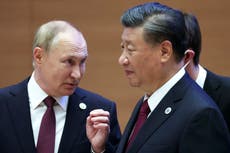French police probe ‘poisoning’ of TV journalist who denounced Putin’s war live on air
Marina Ovsyannikova was sentenced in absentia to eight and a half years in prison in Russia
French police are investigating the suspected poisoning of a Russian state TV journalist who denounced Vladimir Putin’s invasion of Ukraine live on air and later fell suddenly ill.
Marina Ovsyannikova, who escaped Russia after her on-air protest and settled in France, reported feeling suddenly ill as she left her Paris apartment and was hospitalised after she called emergency services.
She said she suspected she was poisoned, the Paris prosecutor’s office said, adding that they were examining her apartment and an investigation was underway.
Ovsyannikova, who worked for Russian state television’s Channel One before the war began, drew international headlines in March 2022 when she appeared on screen in the background of a live broadcast by another news anchor and flashed a sign that said: "Stop the war, don’t believe the propaganda, they are lying to you here."
She was fined 30,000 roubles (£460) for her protest but continued her opposition to the war. During a subsequent solo protest in Moscow, she held up a poster which read: “Putin is a murderer, his soldiers are fascists.”
She was then arrested and put under house arrest in August before she fled along with her daughter in the dark of the night.

Media watchdog Reporters Without Borders (RSF), which assisted Ovsyannikova in her efforts to escape a lengthy trial in Moscow and potentially a prison sentence, helped her settle in Paris.
Christophe Deloire, director general of RSF, said he met Ovsyannikova after her malaise outside her Paris apartment.
Deloire, writing on X, said the possibility Ovsyannikova had been poisoned had not been ruled out, though she was feeling better since the incident.
“We have opened an investigation,” a spokesperson for the Paris tribunal prosecutor’s office said by telephone,” he said. “She said she had a malaise.”
“All we have for the moment is what she said.”
RSF said its team has been ‘’at her side" since she sought medical attention, though they have not disclosed any further details regarding the incident.
Earlier this month, a Moscow court sentenced Ovsyannikova in absentia to eight and a half years in prison for spreading false information about the Russian military.
Her sentencing was the latest example of Russia’s crackdown on dissenting voices in the country, which has intensified since Russia launched its invasion of Ukraine around 20 months ago.
Russia has called its attack on Ukraine a “special military operation” and banned organisations or the media from referring to it as a war or invasion.
Join our commenting forum
Join thought-provoking conversations, follow other Independent readers and see their replies
Comments


Bookmark popover
Removed from bookmarks